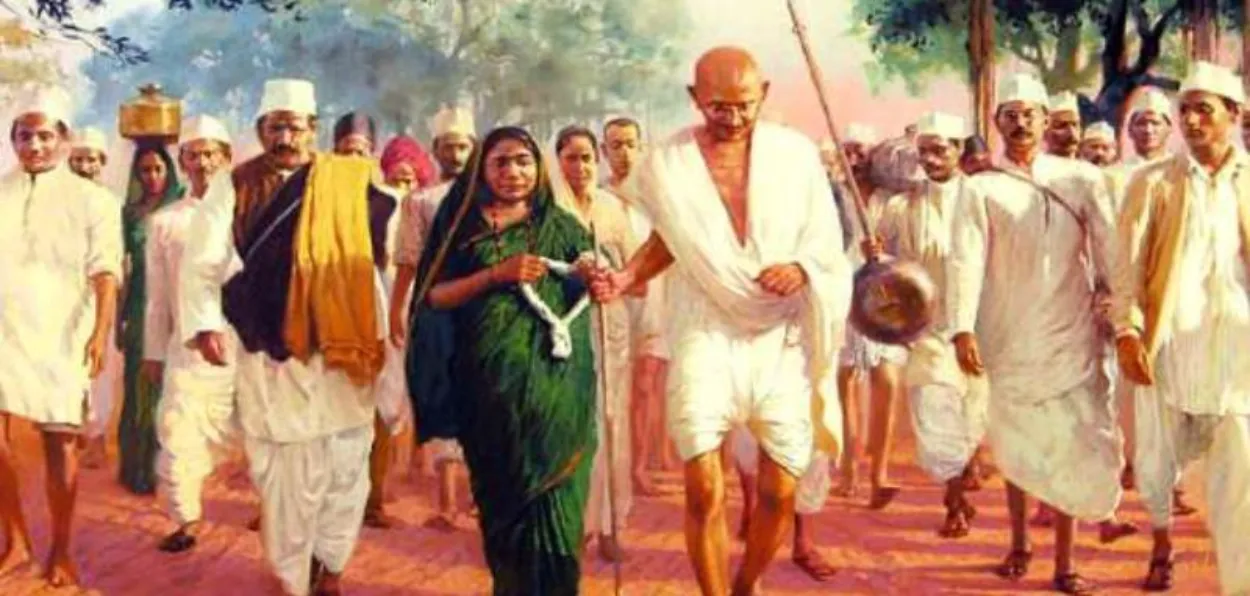
Saquib Salim
Salt Satyagraha, or Dandi March, is considered one of the biggest mass agitations led by Mohandas Karamchand Gandhi (Mahatma Gandhi) against the British colonial empire in India. Gandhi turned the resistance to tax imposition of salt into a mass movement.
The idea of turning anti-salt tax agitation into a mass movement was not a novel one. In 1844, Surat had witnessed a similar agitation and the British government had to bow to the demand of the agitating people. The movement was led by Sharif Shaik, head of the Dargah of Syed Na Ali Adroos.
Shaikh led a 30,000-strong mob to the colonial offices, including courts, in Surat on 30 August 1844. This agitation against the hiking of salt duty from 8 Annas per mound (approx. 37 Kg) to 1 Rupee per mound was peaceful.
The Bombay Times andJournal of Commerce reported the incident as, “On Thursday the 29th ultimo about 3 p.m. nearly the whole of the inhabitants of the city having collected together proceeded to the Adawalat to represent to the judge, the misery and hardship that was entailed on themselves and families, by the promulgation of the unjust and iniquitous New Act imposing a double duty on salt. On their arrival some of the more exasperated of the mob began to pelt stones etc., and smashed several of the windows of the judge's residences and proceeded to do other damage when intimation was sent to the commandant; an affray commenced on the military arriving at the Adawalat in which an old woman was killed and several people severely bruised and wounded. After a considerable difficulty, the mobs were driven back and dispersed to their houses. From the earliest hour this day, as we have before mentioned, the shops were closed, and business was completely at a stand-still. On the morning of Friday mobs again collected in various parts of the city.”
The British Agent at Surat informed his superiors in Bombay (now Mumbai), “Till this time the real character of the disturbances was not understood. They were generally supposed to be occasioned by the lowest classes of the Hindus, who as they did not seem disposed to harm or resort to violence it was hoped if they were not roused by too much interference on the part of the Police would soon get over their feeling of discontent and return to their ordinary occupations.”
Soon, the British officials realised that the agitation was more widespread, and not only “the lowest classes of the Hindus” but also the upper classes of the Hindus, Muslims, and Parsis joined the movement. The Salt Tax was withdrawn on 31 August after it was realised that the mass movement could expand further and might turn violent.
It was reported by The Bombay Times, “Sir Keith, Collector, had suspended the Salt Act, finding that the Mahomedan portion of the populace was about to join the riotous mob.”
Previously, the British officials had asked Sharif Shaik about the agitation. He replied with a written statement on 30 August, which said, “Since this morning, the whole men of the city have united and assembled at my house and urged me to proceed with them to the Sirdar Saheb (the Agent for the Honourable the Governor)....... My hope therefore, is that the beneficent Saheb to quiet the minds of the people will order the public crier to go through the city and proclaim for their satisfaction to sell it (i.e. that salt) at the price at which it was formerly sold, after which the people will all be pleased and go to their houses and keep the bazaars open.”
In an official letter, Sharif was informed, “I beg therefore you will have the kindness to take the trouble to explain this to them and desire the people to go to their houses and be busied about their own affairs which will afford me much pleasure. After you have explained this to them, if they desire to represent the matter to the Government you can tell them to present a Petition to me which I shall forward to the Honourable the Governor at Bombay and afterwards inform them what answer I shall receive.”
The agitation did not stop at this. Sharif wanted the tax to be withdrawn first. The agitation stopped only on 31 August when the tax was withdrawn for good. It was reported, “ ‘High officials, after discussions and negotiations, were convinced of the absolute necessity of yielding to the wishes of the people.’ This course was accordingly resorted to. Thousands of people acclaimed the result with great acclamations’ and ‘in less than one hour the shops were opened and everything was going on as usual ’.”
ALSO READ: Muslim scholars condemn Bangladesh violence against Hindus
Almost eight decades later Gandhi broke the salt law at Dandi near Surat to kickstart the Civil Disobedience Movement. Of course, the situation had changed. Communication channels, the nature of the imperial government, and the attitude of the Indian people had changed over all these years. the sentiments related to the salt tax seemed to remain unchanged.
